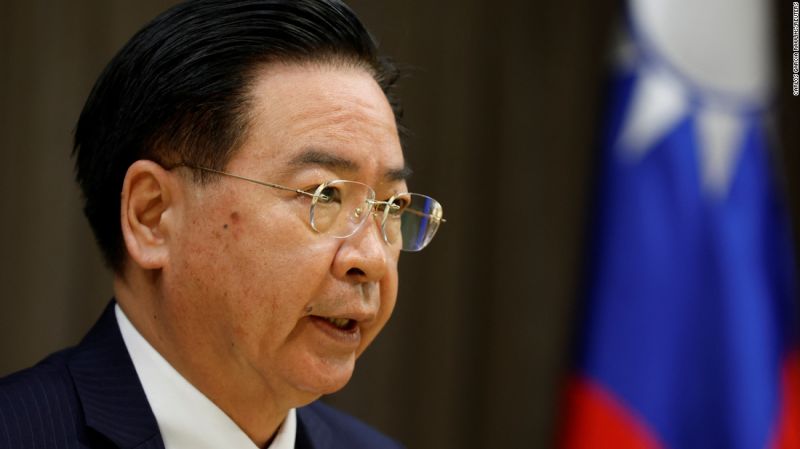One day after China simulated “joint precision strikes” on Taiwan during military exercises around the island, Taiwan’s Foreign Minister Joseph Wu condemned Beijing’s actions in an exclusive interview with CNN and warned that “they seem to be trying to get ready to launch a war against Taiwan.”
“Look at the military exercises, and also their rhetoric, they seem to be trying to get ready to launch a war against Taiwan,” Wu said.
“The Taiwanese government looks at the Chinese military threat as something that cannot be accepted and we condemn it.”
Asked if Taiwan has any sense of the timing of potential Chinese military action, given US intelligence assessments that Xi has instructed his military to be prepared by 2027, Wu expressed confidence in Taiwanese preparations.
“Chinese leaders will think twice before they decide to use force against Taiwan. And no matter whether it is 2025 or 2027 or even beyond, Taiwan simply needs to get ready,” he said.
The exercises appeared to mark the first time the Chinese navy has simulated strikes by aircraft carrier-based warplanes on Taiwan.
Beijing launched the drills on Saturday, a day after Taiwan’s President Tsai Ing-wen returned from a 10-day visit to Central America and the United States where she met US House Speaker Kevin McCarthy and other US lawmakers.
Beijing described them as “a serious warning against the Taiwan separatist forces’ collusion with external forces, and a necessary move to defend national sovereignty and territorial integrity.”
Asked if the costs of such a visit were too high, Wu told CNN, “China cannot dictate how Taiwan makes friends. And China cannot dictate how our friends want to show support to Taiwan.”
Beijing conducted similar large-scale military exercises around Taiwan last August, after then-US House Speaker Nancy Pelosi visited the island.
Those exercises included Chinese missile launches over the island, something that has not been seen so far in the current drills.
Taiwan and China have been governed separately since the end of a civil war more than seven decades ago, in which the defeated Nationalists fled to Taipei. Taiwan transitioned from authoritarian rule to a democracy in the 1990s and is now ranked one of the freest jurisdictions in Asia by Freedom House, a US-based non-profit organization.
However, China’s ruling Communist Party claims the self-governing island as its territory, and in recent years, as his power has grown, Chinese leader Xi Jinping has made clear his ambitions to “reunify” with the island – by force if necessary.
China’s exercises also coincided with a state visit by French president, Emmanuel Macron, who was welcomed in Beijing by Xi.
Following his meeting, Macron appeared to question whether France should get involved in the Taiwan crisis, telling reporters that the “worst thing would be to think that we Europeans must become followers on this topic and adapt to the American rhythm or a Chinese overreaction.” French officials later said his comments were misinterpreted. Wu told CNN that Taipei has asked France for clarification.
“We are still trying to figure out what he says and what that means through the French government,” Wu said, though he noted the “French government has been showing support to Taiwan.”
As tensions between the US and China have worsened over Taiwan, President Joe Biden has said that the US would defend the island militarily if China were to attack, though administration officials have insisted the US remains committed to its “one China” policy.
The US, through the Taiwan Relations Act, is legally obligated to provide Taiwan with defensive weaponry, but officials typically remain deliberately vague on whether the US would defend Taiwan in the event of an attempted Chinese attack.
While Wu repeatedly emphasized “defending Taiwan is our own responsibility,” he noted that with its relationship with its allies in the region, “the United States seem to be more determined than ever in creating a situation (so) that China would know that its military attack against Taiwan is going to be associated with a heavy cost. And we appreciate the United States for having this posture.”
Read the full article here





